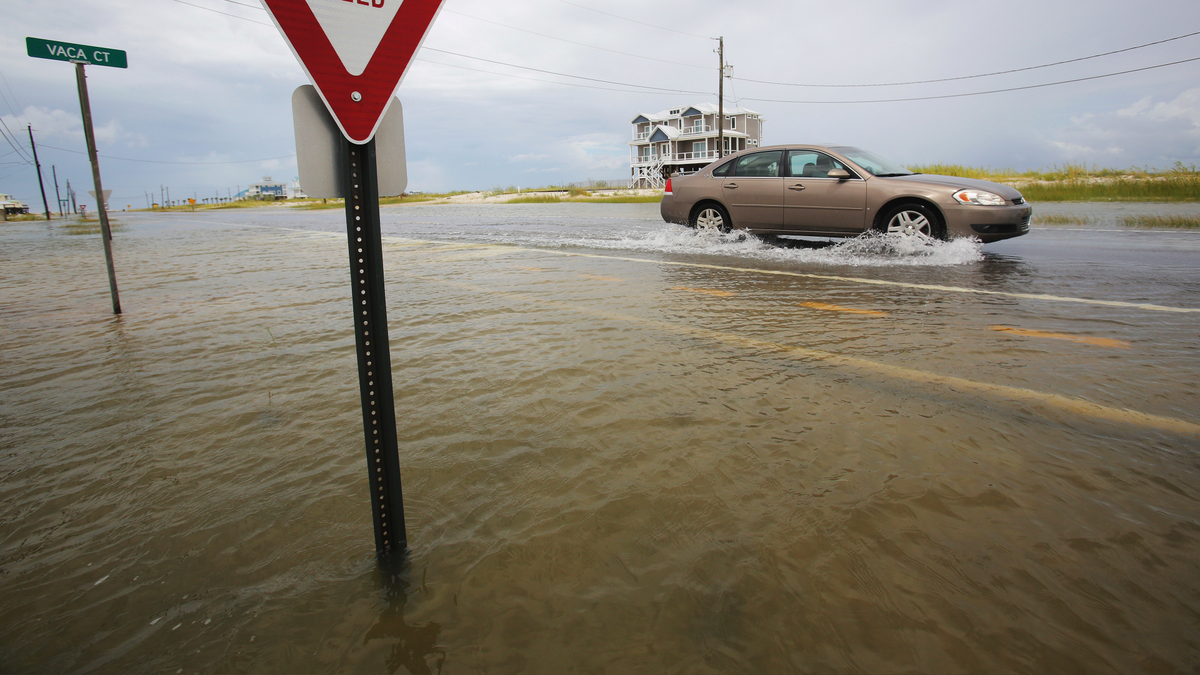
GULFPORT, Miss. – Sandbags were filled, patio furniture was taken inside and shoppers stocked up on batteries and bottled water as people along the Gulf Coast prepared Tuesday for Tropical Storm Gordon, which was forecast to become the second hurricane to hit the region in less than a year.
Just hours before the storm was expected to come ashore, a few people remained on the beach, soaking in the sun before the tropical rain bands became more numerous. Others did their familiar pre-storm preparation rituals, including the staff at The Hotel Whiskey in Pass Christian, which planned to stay open Tuesday night using sandbags to keep out water from the Gulf of Mexico, only a block away.
"All the outside furniture has to come in, but honestly it's not even a freak-out kind of hurricane, so we're not super-stressed right now," Manager Ashley Peeples said around midday Tuesday.
A hurricane warning was in effect for the entire Mississippi and Alabama coasts with predictions Gordon would become a Category 1 storm. The National Hurricane Center predicted a "life-threatening" storm surge of 3 to 5 feet (0.9 to 1.5 meters) along parts of the central Gulf Coast.
Flooding was also a risk. As much as 8 inches (20 centimeters) of rain could fall in some parts of the Gulf states through late Thursday as the tropical weather moves inland toward Arkansas.
By late Tuesday morning, the storm was centered 145 miles (235 kilometers) east-southeast of the mouth of the Mississippi River, with top sustained winds of 65 mph (100 kph), forecasters said. It was moving relatively quickly, at about 15 mph (25 kph).
The last hurricane to strike the U.S. was Nate in October, coming ashore in Biloxi with 75 mph (120 kph) winds.
Governors in Alabama, Mississippi and Louisiana all declared states of emergency for Gordon, allowing them to quickly mobilize state resources and National Guard troops to help during and after the storm.
Gordon became a tropical storm Monday near the Florida Keys, so residents and businesses rushed preparations Tuesday. But for some people, it was just another beach day with a bit of a breeze.
Morgan Kearley took the potted plants off her porch Tuesday before heading to the beach at Bay St. Louis with her husband, their daughter and a niece and nephew. They stayed near the edge of the water as a stiff breeze from the south rarely relented.
"I think we've had worse in the past," Kearley's husband, Shane, said.
Mayors of barrier islands in the storm's path warned that their communities might get cut off from the mainland. Gordon appeared to be coming toward Dauphin Island, Alabama, closer to low tide around 7 p.m. Tuesday. Police planned to monitor the only highway to the mainland.
"When you get the higher waves, water starts splashing across. Sometimes it starts pushing not only water across but debris, logs and things of that nature, which makes it very treacherous to get across," Mayor Jeff Collier said.
Gordon was poised for only a glancing blow to New Orleans, where Mayor LaToya Cantrell said the city has "the pumps and the power" needed to protect residents.
Authorities issued a voluntary evacuation order for areas outside the city's levee protection system, including the Venetian Isles, Lake Saint Catherine and Irish Bayou communities.
L. J. Cazaux moved his boat to a nearby lot of elevated land before the rain started in Venetian Isles. He elevated his house off the ground after Hurricane Katrina in 2005 and has food, water and two generators.
"You just blend it into your lifestyle when you live outside the levee system. You know you're going to flood before anyone else does. The good part about it is the water goes down faster here," said Cazaux, who has lived in the neighborhood for 15 years.
Gordon wasn't the only storm being watched by forecasters. Hurricane Florence was some 2,400 miles (3,900 kilometers) away from the U.S., and another potential storm was likely to form not far off the coast of Africa and head east.
The National Hurricane Center said it is way too early to know if either of those storms would have any impact on land.
"It's the peak of hurricane season. Now is the time to get your plans all set," Hurricane Director Ken Graham said.
___
McGill reported from Bay St. Louis, Mississippi. Associated Press writers Jeff Martin and Ben Nadler in Atlanta; Emily Wagster Pettus in Jackson, Mississippi; Kim Chandler in Montgomery, Alabama; Rebecca Santana in New Orleans; and Jeffrey Collins in Columbia, South Carolina, contributed to this report.









































